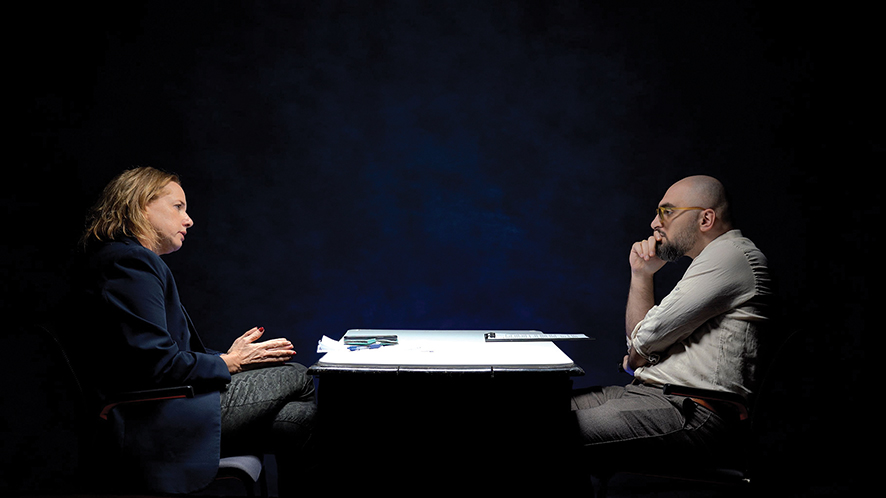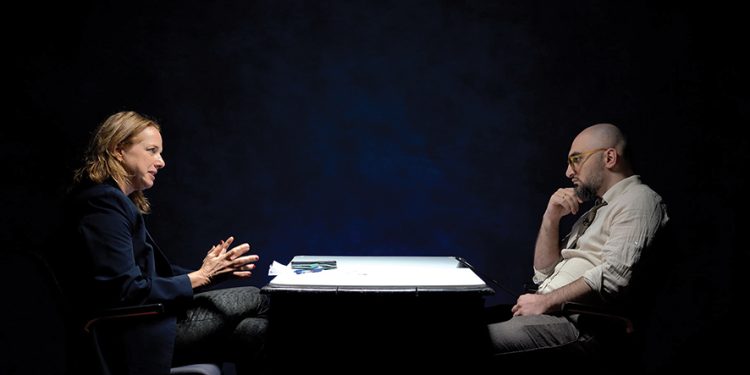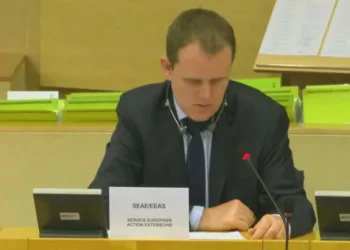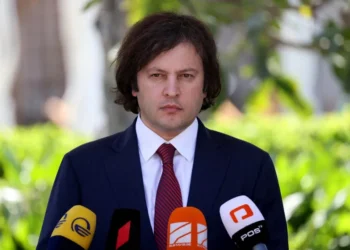“I have on my phone horrible pictures, pictures that I’m not posting. I posted difficult material on social media, but I didn’t really show them, and I’m not planning to show the really horrible ones. These I’m showing to people at personal meetings, people I think should know… But we have testimonies of doctors who are in the pathological field and they’re describing what they’ve seen, and it’s devastating. The body of a young boy who was tied to his mother and both were burned alive. I mean, how sadistic do you have to be to do that? Cutting the fingers off a young boy before killing him in front of his parents. A pregnant lady- they cut open her belly and then shot the unborn baby. Rape. We know that there was a lot of sexual violence, including with minors, and with the hostages that were taken. This is the level of pure, sadistic evil. We think the world should know that this is Hamas, because people seem to be either confused or ignorant, or choose to be confused or ignorant. And they think this is to do with the Israel-Palestinian conflict which the Palestinians blame on us. It’s not. Hamas is not working for the benefit of the people of Palestine, of the Palestinian people, because Hamas is not about a two state solution. Hamas is about eliminating Israel,” – Israeli Ambassador to Georgia, Hadas Ester Meitzad, told Radio Free Europe/RL’s Georgian Service.
How do you think Israel’s history will remember the October 7 attack?
It’s a day we will never forget, the scale of the attack and the nature of the attack. When the German Chancellor visited Israel, and he met the survivors of the Hamas attack, he referred to Hamas as new Nazis. Because it wasn’t just murder and killing: it was butchering, it was slaughtering. It was sadistic, and people took joy in this sadistic massacre. Since the Holocaust, there hasn’t been a day in our history that so many Jewish people died on the same day.
And Israel is responding to that day. What is Israel’s goal in its response? What does it want to achieve?
We had no plans to be in this war against Hamas, but the purpose is first and foremost to remove the threat. It’s understood that we cannot go back to living next door to this brutal ISIS-like organization, and the reality has to change. We need to ensure that Hamas will no longer have the ability to govern Gaza, or to hold this military terrorist threat over the people of Israel. That’s in addition to bringing home each and every one of our hostages safely. These are the two main goals of this war.
Let’s assume the first goal is achieved and Hamas is removed from Gaza. What happens next? Who comes in?
Good question. It’s a question that shouldn’t only be put at the Israeli doorstep, but one which involves other countries in the region, as well as the Palestinian Authority. Israel disengaged from the Gaza Strip in 2005. There has been not one Israeli soldier inside the Gaza Strip since, aside from specific limited military operations, like the one we had in 2014.
When we left the Gaza Strip, it was a chance for the Palestinian Authority to start the process of state building, because this was our aspiration. And what happened is Hamas first won the “election” and later on took force in a very brutal way, by killing 165 members of the Palestinian Authority. And since 2007, Hamas has become everything in the Gaza Strip. It’s the only authority, it’s the one in charge of all the civilian life, to the extent that they are stealing and abusing and diverting resources coming into the strip to their own killing machine.
So this is not solely an Israeli problem. And I think that, for example, when we saw President Macron in Israel talking about forming a coalition, it shows the world also understand that this is not just Israel and Hamas, but is something much bigger and wider.
You say Israel left Gaza completely, but the Palestinian authorities repeatedly claimed it was under occupation by Israel.
First, we need to differentiate between the West Bank and Gaza. We are still very present in the West Bank, but not at all in Gaza. Second, I will refer you to international law. We are fighting this war against Hamas in accordance with international law. This is not a situation of occupation, because we are not present there. So the Palestinians can claim as much as they like, but this is just not the case. I think Abu Mazen, the Palestinian president, head of the Palestinian Authority, has been avoiding any responsibility, doing his utmost not to have to go back into Gaza. And Israel is being blamed for everything. In the Middle East, since the days of our establishment 75 years ago, we’ve been the scapegoat of everything that anybody else doesn’t like there. But, including in these days of war, everything that we’re doing and saying is verified, checked. And there has been no Israeli presence in the Gaza Strip since 2005. This is a fact.
Onto the French President’s proposal to form an anti ISIS-like coalition. What are the chances of that happening?
This is a question for the international community. We’re seeing a very impressive team of world leaders coming one after the other to Israel. President Biden, of course, and State Secretary Blinken, who has been hopping all over the region and came twice to Israel, even three times. The German Chancellor, British Prime Minister, President Macron. If I’m not mistaken, the Canadian Prime Minister is also planning on coming to Israel, and a lot of our European friends have also visited. We wouldn’t have seen that if they didn’t support us. And there’s even more: Egypt tried to hold an international conference. It ended without any agreement, because the western countries refused to sign a paper that doesn’t hold Hamas accountable for this terror attack, and talks about Hamas being a terror organization. This says a lot about the extent to which the world is united behind Israel and also the understanding that this is not a local, domestic issue.
Any idea whether the Russian president is going to visit Israel?
I’m not aware of his coming. I know it took him a full 10 days to express his condolences, but I’m not aware of any plans to visit.

Let’s go back to Israel’s response and the ground incursion. What do you think the cost of that will be for each side?
The cost will of course be that more people lose their lives. I don’t see how one can fight a war ensuring that nobody will get hurt, because war is a very, very ugly affair. But I think that the question should be looked at from another direction: What is the threat that Hamas is posing to Israel and to western societies while it continues to exist? The world united to defeat ISIS, and although the idea was not fully defeated, and we still have pockets, ISIS no longer exists as a massive organization instilling terror and fear in the minds of so many people outside of the Middle East. Back then, the understanding was that people will lose their lives, soldiers and civilians, at the cost of agreeing that we could not afford to live in a world where ISIS exists. The same goes here: the world cannot afford to continue living with Hamas after we saw how little children were executed, brutalized, raped; how families were burned alive. We cannot allow this to continue existing. So this is what you need to ask yourself: what will the cost be if Hamas continues to exist; if we don’t take action?
The civilian casualties have been a major concern among the international community. Any idea what the death toll is?
No, I don’t know. And I will tell you why I don’t know: The source of information that everybody is quoting is the Ministry of Health of Gaza, and the Ministry of Health in Gaza is Hamas. I’m not saying that there aren’t casualties over there, there are, despite the fact that we’re doing everything we can to prevent harm falling on the uninvolved population. Of course, there are casualties. “A” because war is, as I said, an ugly affair. And “B” because Hamas is doing exactly the opposite: as much as we try to spare the lives of the uninvolved, Hamas has an interest in doing exactly the opposite.
I will say also on those numbers coming from Hamas: how can one take it as a reliable source of information when it comes from the same people that just weeks ago stopped at nothing to kill?
Over 20 years, Gaza, instead of flourishing as an independent state, turned into a place where terrorism is celebrated
Let’s talk about the hospital incident. Hamas came out and accused Israel of deliberately targeting a hospital and that hundreds of people were in a critical condition or dead. We say nothing for three hours, a lifetime to the media, because we want to verify the details first. We know we didn’t attack the hospital, this we can say immediately, but we want to be sure exactly what happened, and to be sure it wasn’t as a result of our war on military targets in the Gaza Strip. After three hours, the IDF comes out and says not only was it not us, but also proves it: here we have footage of the Palestinian Islamic Jihad firing rockets at Israel, and one of them falls on the hospital because they’re hiding in the vicinity, using the hospital as a human shield.
Is there a tentative number of civilian deaths in Gaza at which point Israel might reconsider its war goals? Or is it “to the end,” no matter the cost?
I don’t think it works like that. Numbers are not the only aspect you need to take into account when you’re analyzing a military target. You have to consider what threat this target possesses. This is where you start the discussion from. I’m not saying the numbers aren’t high, but we need to ask how many of them are being sacrificed deliberately by Hamas, because we have repeatedly told the civilians to evacuate south to the humanitarian zone. This is where humanitarian aid is going, also from the Egyptian side. We’re not obliged to provide humanitarian aid to Gaza, but we are obliged to allow humanitarian aid to enter Gaza. I say check your sources, check information and the facts on the ground.
Let’s look at the Palestinian counter-arguments, not necessarily Hamas, that at least part of the blame should be put on Israel for the current situation, not for the Hamas attack itself, but the situation in Gaza today.
What was President Mahmoud Abbas’ response to the brutal attack by Hamas? Did you hear him condemning it? No. He kept silent. The elected leader, the one the Palestinian population chose to represent them, and he was unable to condemn the killing of babies, just because they are Israelis and Jews.
I think people are missing the point of what took place here, because there is a political debate between us and the Palestinians, and there is a discussion about occupation. You have many people supporting the Palestinian aspiration to have an independent state, and that’s okay. This is a debate that will continue to exist. But to justify the murdering of 1400 people? In the Hamas charter, they are not aspiring to the two state solution. The Hamas charter is about eliminating the State of Israel. Hamas is supported by Iran. Iran is a country openly saying “this Zionist regime needs to be eliminated.”
Hamas is about murdering as many Israelis and Jewish people as they can, and the fact that we don’t hear anything from the Palestinian leadership is beyond disappointing. I remember seeing the body of a young girl, half naked, being paraded in the street of Gaza and brutalized. I think that we need to look into how a barbaric and murderous act can be celebrated and cheered on in such an institutionalized manner.
They claim it’s a reaction to the what they perceive as Israeli occupation, and refer to the universal truth that the oppressed will at some point inevitably lash out.
We are not occupying Gaza. We used to say that Gaza City could have evolved into Singapore. We haven’t been in Gaza for 20 years. And Gaza, instead of flourishing, taking its first steps as an independent state, turned into a place where terrorism is celebrated and dominating.
Is the two state solution dead? How do you plan to co-exist with Palestinians if so?
It’s an excellent question, because at the moment, we have a trust deficit. How can I trust when they come into our house and murder us in the most brutal way? When the legitimate representatives of the Palestinian people are silent and are unable to even condemn it?
But while it’s very difficult for us at the moment, we never know. I mean, in 1973, we fought a very difficult war against Egypt and Syria, and six years later, we signed a peace agreement with Egypt, which is still holding, and it’s a very important one.
It’s hard to look beyond the present right now, but I haven’t given up hope of living in a better world.
Who will the families of the civilian population perishing in Israel’s response blame?
I understand that they will blame Israel, but we’re obliged to remove the threat that Hamas is posing. I think there are a few brave people there, ones who also aspire for Gaza to be freed from Hamas, who think of Gaza as being occupied by Hamas, not by Israel. I hope that those voices will become bolder. But I think that at the end of the day, this is where leadership is needed, a brave leadership that says, “We have a chance to end this bloody conflict, but it means we have to denounce terrorism, we have to come out and say, ‘No more’.”
We need to ask ourselves: what will the cost be if Hamas continues to exist; if we don’t take action?
Yes, it’s a circle of hatred, but I don’t know if it’s our responsibility. There is a lot of Palestinian responsibility here. If you’re used to blaming Israel for everything, that is bad, as is being comfortable with the world supporting you financially – there is something very corruptive about this way of living and this way of behaving.
When Israel was established in 1948, our starting point was extremely weak. And, really, against all odds, and in 75 years, we built a very impressive country, leading in technology and information, one that is sharing knowledge, here in Georgia too. We took this path, because you need to decide that you take responsibility for what is yours, and you’re building yourself and you’re moving forward. Every five to seven years, we had to face a war that was always started by the other side, by those who try to eliminate us, to bring an end to our existence in the Middle East. And despite that, we managed to become strong enough to win these wars and to build our economy and our society in a way that our country could become a proud member among other nations. You need to decide if you are choosing to build statehood, if you are doing that, or if you’re always looking to blame the other side.
I’m not saying the death toll isn’t high, but we need to ask how many are being deliberately sacrificed by Hamas
On that famous quote from Golda Meyr, that peace will come to Arabs when they love their children more than killing Jews – How far do you think we are removed from that day?
I’m sorry to say that after the bloody October 7, I don’t know what to tell you. If you’re firing rockets from behind your own hospitals, if you’re putting trucks in the road to prevent your people from moving south, if you’re sitting on storage of half a million liters of fuel and you’re not giving it to those who need generators…you know, Hamas built a web of tunnels underneath Gaza, not dirt-and-soil tunnels but cement war tunnels. This is where they’re running their operation from, where the killing machinery is being activated from. For these tunnels to exist, they need a ventilation system, they need electricity, because it’s all deep, deep underground. So this is what they need fuel for, they need fuel to maintain their ability to continue killing Israelis and to do so at the expense of their own people. So all this crying out that “we need fuel for the hospitals,” well, Hamas has the fuel, though its people need the fuel. This is what we are facing here.
Let’s talk a bit about external actors. Whose involvement do you see in this, and what kind of impact will it have internationally?
All the dots lead to one place, which is Iran. And if you’re looking for the one who has been sponsoring terrorism, not just against Israel, but everywhere in the Middle East, where you see militias, unaccountable groups with sophisticated weapons, Iran is behind it, whether it’s Iraq, whether it’s Yemen, of course, the Houthis. Lebanon goes without saying- we all know that Hezbollah is not just an Iranian proxy, it’s the right hand of Iran. Syria, President Assad is still with us after he used chemical weapons to murder his own people. The only reason that he is still with us is Iran, because they were the ones to back him, to assist him in murdering and butchering his own people.
There is another country that assisted Assad.
Yes, but I think the Iranians, the extent of the military guidance, support ammunition and manufacturing on a whole different scale. Assad owes his existence to the Iranians. What we’re seeing in the Middle East is the axis of evil. I’m seeing Iran, Syria, Lebanon, Hamas and the Palestinian Islamic Jihad. Hamas is a Sunnah organization, Iran is Shia. It doesn’t matter. For many, many years, Iran has been supporting Hamas financially by transferring arms, through know-how training. This collaboration is not something new. It’s something that has been happening for many years.
They are not aspiring to the two state solution. The Hamas charter is about eliminating the State of Israel
I would argue that while Assad received support from Iran, is it unfair to say that he owes his survival only to Iran, when Russia’s intervention is what made it possible.
Russia, of course, also supported Assad. Russia supported Assad politically, in the UN, in other places, and Russia is present in Syria. But still, when I’m looking at all the foreign fighters that came from various countries to fight in Syria, who was training them? Iranian commanders. I’m not disagreeing with you, but I’m saying that Iran has been the one passing Assad and his terrorist militias the know-how and the ammunition for so many years.
Russia casts a long shadow in Georgia. What is Russia’s relationship with Hamas?
Russia recognized Hamas as a political entity. For many, many years, we have this disagreement with Russia, and we keep on telling them that Hamas is a terrorist organization. Anybody who is, after the October 7 attack, unable to denounce Hamas as a terror organization… I will just say that this is a very disappointing reaction.
What impact do you think it will have on Tel Aviv and Moscow’s relationship?
The Israeli public is very much interested in how the world sees the events that took place. Because of the scale of the tragedy, and because of what happened to us, to my people. When President Biden delivered his firm, emotional address, I think that in most living rooms in Israel, people were on the verge of tears. On the opposite side, I think the Israeli public is also seeing who are the ones not standing with us. As in every country, public opinion matters.
Interview by Vazha Tavberidze














